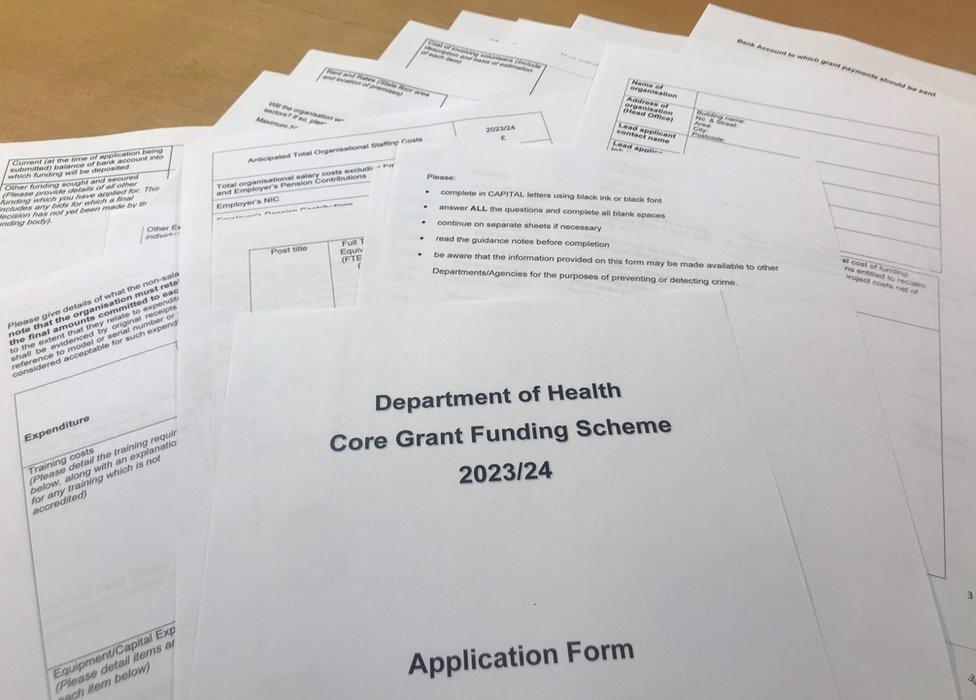Northern Ireland charities 'in crisis' over Stormont funding scheme halt
- Published

Northern Ireland's charity sector is facing the "worst funding crisis imaginable", Valerie McConville from the CO3 Organisation said
Northern Ireland charities have said they face a funding crisis after an annual grant competition was halted days before the new financial year.
The Department of Health's Core Grant Funding scheme opened in October, with £3.6m of funding to share out.
But 256 bidders applied and the grants they sought exceeded £25m.
The department has now suspended the process but will fund 64 existing recipients for just three months until it gets more clarity on its budget.
Charitable and voluntary organisations have criticised the move so late into the bidding process, which they said has added to their current financial uncertainty.
Valerie McConville, from the CO3 organisation, told the Evening Extra programme that the move had been "very insulting" to the charity leaders who submitted applications.
CO3 represents 760 charities, community groups and voluntary organisations across Northern Ireland.
She said members had been "hugely let down" that the funding process had been halted.
Ms McConville added that reapplying in the autumn will "take even more time and resource away from vital service delivery as they (staff) scramble to get sufficient funding to continue operations".
She said many charities have already put staff on notice of redundancy as a consequence of the imminent loss of European Social Fund money from 31 March.
"It is unconscionable, in 2023, that charities delivering these essential services - on behalf of the state and wider society - are now in the worst funding crisis imaginable," she said.
'Total mismanagement'
Stormont's Core Grant Funding Scheme offers financial support to not-for-profit organisations that provide services which improve public health and social wellbeing.
The Kilcooley Women's Centre is among the organisations that applied to this year's grant competition.
The centre in Bangor, County Down, provides practical support to many vulnerable groups including the elderly; carers; victims of domestic violence and people in food poverty.
Its chief executive Alison Blaney explained the grant application was a time-consuming process and a team of five people from the centre worked on it "intensively" for up to five weeks.

The Core Grant Funding Scheme application ran to 38 pages and sought detailed financial information
"It isn't a simple process, it's quite a complex form," Ms Blaney told the BBC's Evening Extra programme.
"You have to demonstrate need, demonstrate your capacity to deliver programmes and manage the grants and then give an overview of what you're actually going to do with the project over the period of funding.
"So we were flat out on it because we wanted to put our best effort in to give ourselves the best chance to secure the funding."
Ms Blaney said she had 27 years of experience of applying for similar funding programmes and in that time she had never seen anything like this one.
"No-one is ever guaranteed funding. Funding is a lot of competition so there's always winners and losers.
"However the total mismanagement of this project is unbelievable," she said.
The Core Grant Funding Scheme has been running for several years, but in October the then Health Minister Robin Swann extended its eligibility criteria to a wider group of bidders.
"This is the first time in nearly two decades that the scheme has been opened up to applications from previously unfunded organisations," Mr Swann said at the time.
Applicants were invited to bid for grants valued between £5,000 and £200,000.
'Unanticipated' demand
In a statement to Evening Extra on Wednesday, the department said the 2023/24 competition was now "significantly over-subscribed".
"A number of other issues arose with the competition, including the unanticipated high level of funding sought by many of the individual organisations.
"This is despite the fact that core grant is supposed to assist organisations to provide services, rather than being critical to enable them to exist," the statement added.
However, Ms McConville argued that the high demand should have been foreseen in the current financial climate.
"It is clear that if you open a competition for funding, if for the first time in many years it's an open call, there are going to be many, many applicants to that fund," she said.
"So it seems unusual that the department would cite that as one of the reasons for suspending the competition.
"And it seems that if you are going have an open call like that, you would scale up your resources in order to deal with those applications because that is something that funders would expect to happen."
'Not acceptable'
Ms McConville said there had been a "lack of planning and a lack of forward thinking" with this year's grant scheme.
"For the outcome that we have got - i.e. the abandonment or suspension of this competition - which is really bad news for the sector, to come eight working days before the end of the financial year is frankly not acceptable."
The department said it intended to launch a revised scheme in autumn 2023 "subject to the budgetary position".
It added it has "committed to working with the sector to design a new scheme, starting with a meeting with the Northern Ireland Council for Voluntary Action scheduled for tomorrow".
- Published23 January 2023

- Published21 September 2022
